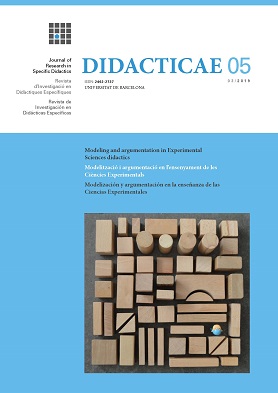Modelización y argumentación en la enseñanza de las Ciencias Experimentales
Modeling and argumentation in Experimental Sciences didactics
DOI:
https://doi.org/10.1344/did.2019.5.3-6Keywords:
specific didactics, experimental sciences didacticsAbstract
Introduction to the monographic issue.References
Adúriz-Bravo, A., e Izquierdo-Aymerich, M. (2009). Un modelo de modelo científico para la enseñanza de las ciencias naturales. Revista Electrónica de Investigación en Educación en Ciencias, 4(1), 40-49.
Bati, K., y Kaptan, F. (2015). The effect of modeling-based science education on critical thinking. Educational Policy Analysis and Strategic Research, 10(1), 39-58.
Clement, J. (2000). Model based learning as a key research area for science education. International Journal of Science Education, 22(9), 1041-1053.
Erduran, S., y Jiménez-Aleixandre, M. P. (2008) Argumentation in science education: Perspectives from classroom-based research. Dordrecht: Springer.
Faize, F. A., Husain, W., y Nisar, F. (2018). A critical review of scientific argumentation in science education. Eurasia Journal of Mathematics, Science and Technology Education, 14(1), 475-483.
Gilbert, J. K., y Justi, R. (2016). Modelling-based teaching in science education. Cham: Springer.
Halloun, I. (2004). Modeling theory in science education. Londres: Kluwer.
Navarro, F. y Revel Chion, A. (2013). Escribir para aprender: Disciplinas y escritura en la escuela secundaria. Buenos Aires: Paidós.
Navarro, F., y Revel Chion, A. (2016), Shaping disciplinary discourses in high school: A two-way collaborative writing program. En J. S. Blumner y P. B. Childers (Eds.), WAC partnerships between secondary and postsecondary institutions (pp. 47-61). Anderson: Parlor Press.
Downloads
Published
Issue
Section
License
Copyright (c) 2019 Andrea Revel Chion, Agustín Adúriz-Bravo

This work is licensed under a Creative Commons Attribution-ShareAlike 4.0 International License.
The authors who publish in this journal agree to the following terms:
- Authors retain copyright and grant the journal the right of first publication.
- Submitting a paper does not involve paying any fees.
- Texts will be published under a Creative Commons Attribution Share-Alike 4.0 International License that allows others to share the work, provided they include an acknowledgement of the work’s authorship, its initial publication in this journal and the terms of the license.
- When citing works published in Didacticae, both the autor and the journal must be cited.
- Didacticae does not accept any responsibility for the points of view and statements made by the authors.



